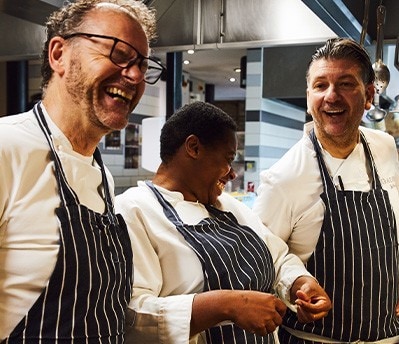A professional kitchen is a demanding environment that thrives on adrenaline and busy services. However, the energetic and vibrant atmosphere may hide a shadowy side. The fast-paced, high-pressure, and emotionally demanding nature of hospitality work has been linked to a growing mental health crisis, affecting employees at all levels.
That’s why we want to shed some light on the importance of mental health and wellbeing as one of the building blocks of a positive kitchen.
What is mental health?
According to the World Health Organisation (WHO), the definition of mental health and wellbeing is "a state of wellbeing in which the individual realises his or her own abilities, can cope with the normal stresses of life, can work productively and fruitfully and is able to make a contribution to his or her own community."
You might be wondering “What is the difference between mental health and wellbeing?”. While mental health refers to emotional, psychological, and social wellbeing, wellbeing encompasses a broader range of factors, including physical, emotional, and social aspects.
How are mental health and wellbeing linked? We can say that good mental health supports overall wellbeing, and maintaining a positive wellbeing environment can improve mental health.
Hospitality can offer great opportunities for individuals to express themselves, work towards goals as a team and as individuals and connect with people. However, the demanding nature of the job, high pressure and sometimes unacceptable behaviours in the kitchen can make it hard to see the positives.
What Does Mental Health Look Like in the Hospitality Industry?

The WHO associates poor mental health to "rapid social change, stressful work conditions, gender discrimination, social exclusion, unhealthy lifestyle, physical ill-health and human rights violations". So, what’s the state of mental health in hospitality?
Unilever Food Solutions conducted a global survey of its chefs in 2023, revealing that 60% believe work negatively affects mental wellbeing to some degree. A stressful environment, long shifts and the struggle to maintain work-life balance are all factors contributing to this statistic.
How do operators deal with the day-to-day stressors of a professional kitchen? Having enough breaks is essential for a balanced workday, and 58% of interviewees say they can have a break when needed. Outside of work, most chefs like relaxing by listening to music, watching TV/streaming, cooking and travelling.
On the other hand, unhealthy habits are quite widespread to cope with stress. 53% of surveyed chefs reported smoking, 46% drinking alcohol and a staggering 26% taking drugs, with illegal drugs mostly being mentioned in the United Kingdom, Switzerland, Australia, Germany and Mexico.
Other factors influencing operators’ wellbeing are:
Generational imbalance: 58% declared they feel a clash between the old and new generations of hospitality workers.
Harsh language: 1 in 3 of the surveyed have experienced verbal harassment in the workplace
Physical health: 68% of those surveyed said that work has a negative impact on their bodies, with backache, sore legs and foot ache being the top-mentioned conditions.
Mental health in the restaurant industry is still clearly a concern. However, here are some practical steps to build a better work environment:
What You Can Do to Promote Mental Health in Your Kitchen

Value and reward your team’s work: Rewarding hard work, whether it’s with a pay rise or simply recognising an employee’s efforts can go a long way.
Promote mindfulness in the workplace: Offer mental health awareness training and share mindfulness techniques that you can practice with your team before or after a shift. Check out our Mental Health Course.
Foster constructive communication: 47% of surveyed chefs revealed that they experience aggressive communication at work. Promoting healthier and more positive communication will result in good mental health and wellbeing in the workplace.
Be open about mental health struggles: Establishing an environment where chefs’ mental health discussions are normalised is essential. Lead by example by being open about mental health challenges, encouraging your team members to share their experiences, and providing resources for support. For example, you can implement a Health and Wellbeing Check-in to monitor your staff’s doing.
We’re in This Together
Even though hospitality is a challenging and fast-paced industry, poor mental health should never be part of the job description. Creating a positive kitchen that fosters staff wellbeing isn’t impossible, but it requires a joint effort to make it standard practice. If you need help on this journey, explore our free resources to shape the future of hospitality.
Start here:
Watch: Mental Health Video